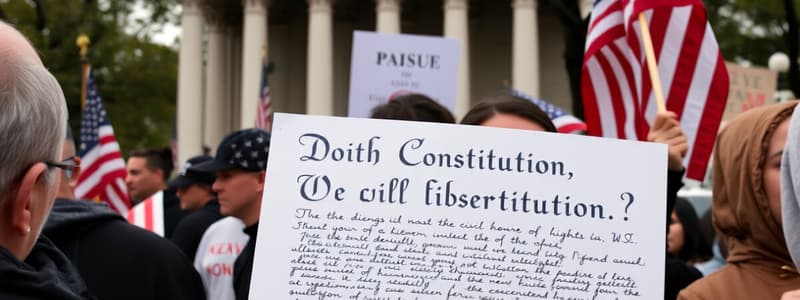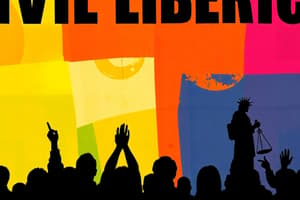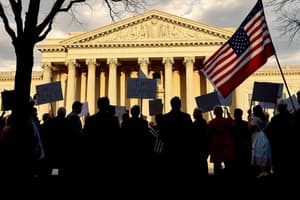Podcast
Questions and Answers
What is the main purpose of the equal protection clause in the 14th Amendment?
What is the main purpose of the equal protection clause in the 14th Amendment?
- To ensure that individuals can speak freely
- To extend civil rights to minority groups (correct)
- To protect individuals from illegal search and seizure
- To prevent double jeopardy in criminal cases
Which of the following describes the principle of incorporation?
Which of the following describes the principle of incorporation?
- The legal principle ensuring evidence is not used if collected illegally
- Government action addressing minority group legal status
- The government providing monetary compensation for private property use
- The extension of the Bill of Rights to the states on a case-by-case basis (correct)
What is the primary difference between a civil case and a criminal case?
What is the primary difference between a civil case and a criminal case?
- Civil cases require a different jury selection process than criminal cases
- Civil cases can only involve monetary damages, while criminal cases can result in imprisonment
- Civil cases are initiated by private parties, while criminal cases are initiated by the government (correct)
- Civil cases involve public prosecutors while criminal cases involve private citizens
What does the exclusionary rule ensure?
What does the exclusionary rule ensure?
What situation exemplifies de jure segregation?
What situation exemplifies de jure segregation?
What is the primary intent of affirmative action?
What is the primary intent of affirmative action?
Which type of speech is referred to as symbolic speech?
Which type of speech is referred to as symbolic speech?
Which term describes the practice of preventing an individual from being tried for the same crime twice?
Which term describes the practice of preventing an individual from being tried for the same crime twice?
Flashcards are hidden until you start studying
Study Notes
Civil Liberties
- Individual rights protected by the Bill of Rights in the U.S. Constitution.
- Defended by the Due Process Clause of the 14th Amendment.
- Examples include freedom of speech, freedom of religion, and the right to bear arms.
Civil Rights
- Government action taken to address the legal status of a minority group in society.
- Protected by the Equal Protection Clause of the 14th Amendment.
- Examples include laws prohibiting discrimination based on race, gender, and religion.
Incorporation
- Process where the Supreme Court extends items from the Bill of Rights to the states on a case-by-case basis.
- Ensures that states cannot infringe on rights protected by the Bill of Rights.
Symbolic Speech
- Form of communication using actions or symbols to convey a message.
- Protected under the First Amendment.
- Examples include protests, boycotts, and flag burning.
Prior Restraint
- Government censorship of a publication before it is published.
- Rarely allowed, as it violates the First Amendment's guarantee of freedom of the press.
Slander
- False spoken statement damaging an individual's reputation.
- Not protected under the First Amendment.
Libel
- False written statement damaging an individual's reputation.
- Not protected under the First Amendment.
Exclusionary Rule
- Legal principle preventing evidence used in court if collected illegally.
- Aimed at deterring police misconduct.
Grand Jury
- Group determining if there's enough evidence to issue an indictment and move forward with a trial.
- Only hears evidence presented by the government.
Trial (Petit) Jury
- Hears a full presentation of a case to determine a verdict of guilty or not guilty.
- Must reach a unanimous verdict in most cases.
Double Jeopardy
- Prevents an individual from being charged with the same crime twice.
- Protected by the Fifth Amendment.
Eminent Domain
- Power of government to use private property for public use if fair compensation is provided.
- Permitted under the Fifth Amendment.
Criminal Case
- When an individual or group is accused of violating a law by local, state, or federal government.
- Government acts as the prosecutor.
Civil Case
- Non-criminal lawsuit between two private parties.
- Can involve issues such as contract disputes, personal injury, and property disputes.
De Jure Segregation
- Segregation enforced by formal laws or rules.
- Found to be unconstitutional in Brown v. Board of Education.
De Facto Segregation
- Segregation present in society as a result of patterns, trends, and historical events.
- May result in unequal access to resources and opportunities.
Civil Disobedience
- Peaceful protest of unjust or unfair laws.
- Can take many forms, such as marches, boycotts, and strikes.
Strict Scrutiny
- Used by the Supreme Court to determine the constitutionality of laws that discriminate against certain groups.
- The government must prove a law is constitutional because it serves a compelling government interest and is done in the least restrictive way possible.
Equality of Results
- Action taken so that people can achieve the same end result.
- May involve affirmative action programs or other government initiatives.
Equality of Opportunity
- Action taken to give people an equal chance to succeed.
- May involve policies designed to level the playing field, such as access to education and employment opportunities.
Affirmative Action
- Actions taken to favor a group that is disadvantaged or subject to discrimination.
- Aimed at creating a more diverse and equitable society by increasing opportunities for historically marginalized groups.
Studying That Suits You
Use AI to generate personalized quizzes and flashcards to suit your learning preferences.




